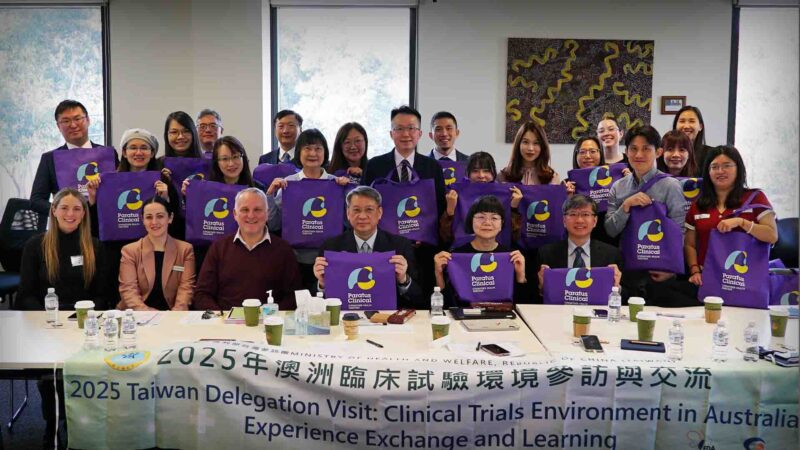NEW OPTION FOR MANAGEMENT OF HIGH-RISK SOFT TISSUE SARCOMA OF THE LIMB International, multi-centre sarcoma trial shows benefits of integrating immunotherapy with radiotherapy and surgery
The Australia and New Zealand Sarcoma Association (ANZSA) is the peak body for the sarcoma community. ANZSA aims to improve outcomes for sarcoma patients through research, education and awareness of sarcomas and related tumours.
ANZSA fosters effective collaborations across multi-disciplinary teams (MDT), which comprise of specialist health professionals (including pathologists, radiologists, surgeons, radiation oncologists, medical oncologists and paediatric oncologists) working together to discuss sarcoma and related tumours cases, and how to best manage treatment and care.
Professor Angela Hong MBBS, MMed, PhD, FRANZCR is the co-Chair of ANZSA’s Scientific Advisory Committee and a Professor at Sydney Medical School of the University of Sydney. She is a radiation oncologist and has been a member of the Multidisciplinary Bone and Soft Tissue Tumour Clinic at Royal Prince Alfred Hospital/Chris O’Brien Lifehouse for the past 15 years.
As a clinician scientist, her research focuses on developing innovative radiation therapy technique and combination treatments to improve the outcome for patients with sarcoma.
Professor Hong spoke to Australian Health Journal about sarcoma and a recently concluded international, multicentre trial, that could lead to a new potential option for patients grappling with high-risk sarcoma of the limb.
Soft tissue sarcoma, a rare aggressive cancer originating in connective tissues, can affect both children and adults. It is particularly challenging to conduct clinical trials due to its rarity, However a recently concluded international collaborative Phase II clinical trial SARC032 has shown groundbreaking findings into the advantages of Immunotherapy for patients with high-risk soft tissue sarcoma of the limb
The trial was led by the Sarcoma Alliance Research Collaboration (SARC) in the United States and the Australia and New Zealand Sarcoma Association (ANZSA) in Australia. The Australian participating sites in the trial were Peter MacCallum Cancer Centre, Chris O’Brien Lifehouse and Princess Alexandra Hospital.
SARC032 is the first completed randomised clinical trial of its kind and has demonstrated compelling evidence to integrate immunotherapy, with the standard treatment regimen of radiotherapy and surgery for patients with grade 2 or 3, stage III soft tissue sarcoma of the limb.
Professor Angela Hong, Australia’s Principal Investigator for the trial, believes these results will be beneficial for patients for this specific stage of sarcoma.
“This is a significant milestone. The integration of immunotherapy into standard treatment protocols heralds a new era in sarcoma management, offering patients and clinicians a potent tool in the battle against this formidable disease.”
You Might also like
-
Taiwanese health and research delegation visit Paratus clinical trial site in Canberra
In late August 2025, a Taiwanese delegation comprising government officials from the Taiwanese FDA, various governmental groups, and physicians and researchers from across Taiwan, visited Paratus Clinical’s trial site in Canberra. Their objective was to explore both the differences and similarities between the clinical research ecosystems of Taiwan and Australia.
-
The role of genomic screening in transforming public health
Dr Jane Tiller is a lawyer, genetic counsellor and public health researcher. She is Ethical, Legal & Social Adviser in Public Health Genomics at Monash University, and a National Health and Medical Research Council Investigator Grant holder. Jane is passionate about the use of genomics to prevent disease, and in delivering equitable access to preventive genetic information at the population level. She is co-lead of DNA Screen, a world-first study piloting the offer of preventive DNA screening to the Australian adult population. DNA Screen has tested over 10,000 young people for genetic high risk of medically actionable conditions such as cancer and heart disease, finding about 2% of participants had genetic high risk. Jane is leading efforts to secure Commonwealth Government funding to expand the DNA Screen program, with the eventual goal of the development of a public health population screening program for disease prevention based on high genetic risk.
-
Generosity of spirit in teaching
The Ramaciotti Medal for Excellence is considered one of the most prestigious awards in biomedical research in Australia and is highly sought after by researchers in the field.
In 2022, Professor Matthew Kiernan was the recipient of the Ramaciotti Medal for Excellence and the associated $50,000 award.
Australian Health Journal spoke with Professor Kiernan to hear about his journey in medicine and science to try and uncover and understand diseases and his generosity of spirit to pass on what he has learnt.



